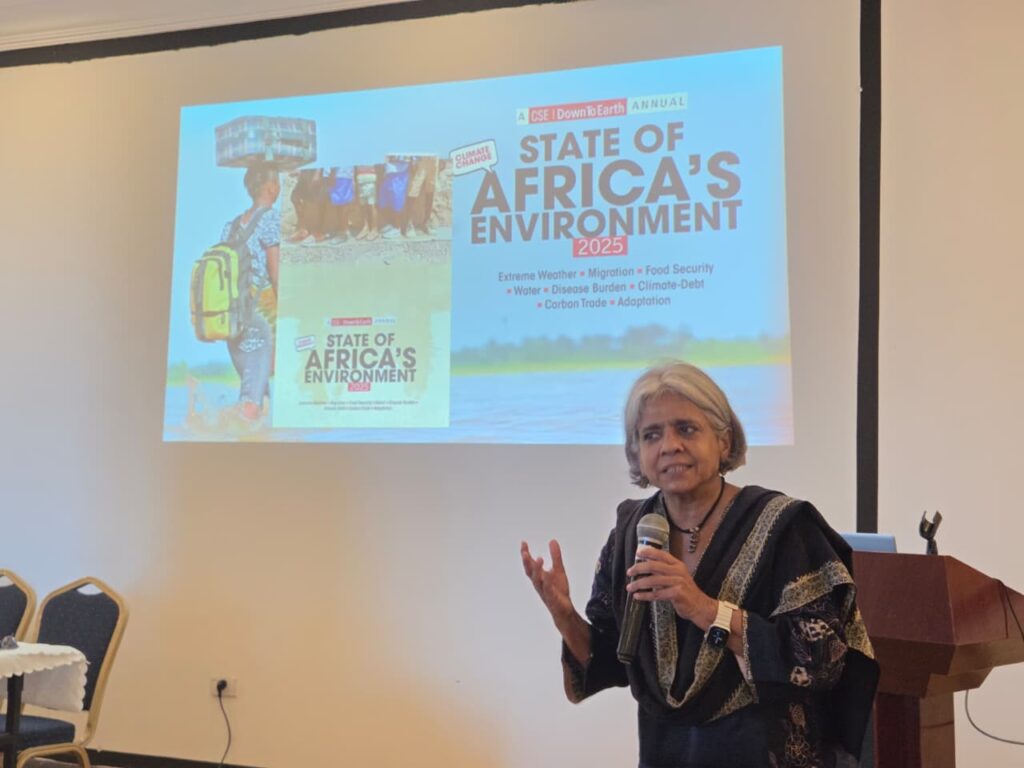By Jenipher Asiimwe (our Reporter in Addis Ababa, Ethiopia)
The Centre for Science and Environment (CSE), India, has released the “State of Africa’s Environment Report 2025”, highlighting the scale of Africa’s escalating climate emergency.
The report shows that over the past 60 years, the continent has experienced a sharp increase in heat waves, with temperatures rising faster than the global average. It identifies 2021–2025 as Africa’s most devastating five-year period, marked by record deaths from weather, climate, and water-related disasters.
The release took place on September 18 in Addis Ababa, Ethiopia, during a two-day conference and media briefing hosted by the Alliance for Science–Ethiopia in partnership with CSE and Media for Environment, Science, Health and Agriculture (MESHA), Kenya. The sessions aimed to equip journalists and stakeholders with a deeper understanding of environmental and development challenges in Africa.
The 152-page report examines critical themes including climate change, migration, food security, water, health, climate debt, carbon markets, and adaptation.
It reveals that 412 million Africans have been affected by extreme weather over the past 15 years, with more than half impacted in the last five years. At least 41,549 lives were lost, most since 2021, while droughts alone affected 178 million people.
Speaking at the event, Sunita Narain, Director of CSE, emphasized that climate change has become the “new normal,” and stressed the need for concrete action: “Stakeholders who already know what must be done should take responsibility, fulfill their commitments, and invite others to join the fight against global environmental challenges cause by the climate change crisis.”
Representing UNESCO, Dr. Rita Bissoonauth, Director of the Addis Ababa Liaison Office to the AU and UNECA, highlighted that the crisis is not only environmental but also deeply linked to inequality.
She urged journalists to humanize climate stories, track financing, and highlight local solutions. The report underscores how the crisis is reshaping communities, warning that Africa could face the world’s highest rates of climate-related displacement if urgent action is not taken.
Nearly 265 million people were forced to move internally in the past year alone, and by 2050, an additional 200 million could become environmental migrants. Conflict-prone countries such as Ethiopia, Sudan, and Somalia are already reporting the heaviest burdens of displacement, with disaster-related deaths three times higher than those recorded between 2016–2020.
Africa’s carbon and food systems are also under stress. By 2024, the continent accounted for roughly one-fifth of all carbon credit projects globally, attracting around $5.9 billion in voluntary carbon market investments between 2013 and 2023,primarily funding forestry, land-use, and community-based initiatives.
Meanwhile, climate change and land degradation have driven an 18% drop in agricultural production, affecting key crops like cocoa in West and Central Africa, and disease transmission, including malaria, is on the rise.
Experts at the summit highlighted solutions. Professor Kassahun Tesfaye, Director General of Ethiopia’s Bio and Emerging Technology Institute, stressed that Africa’s vulnerable natural resources could become its greatest strength through a sustainable bio economy, harnessing crops, forests, animals, and microorganisms in a circular, regenerative system.
Negus Lemma, Deputy Director General of the Ethiopian Environmental Protection Authority, underscored that the most vulnerable populations—rural communities, women, children, the elderly, people with disabilities, and those living in poverty—bear the heaviest climate burdens.
The State of Africa’s Environment Report 2025 concludes that Africa is at a critical juncture: while the continent bears the heaviest costs of a crisis it did little to cause, it is uniquely positioned to lead with solutions. The choice is clear: act now with urgency, equity, and innovation, or risk a future defined by climate catastrophe.
https://www.cseindia.org/state-of-africa-s-environment-12867
www.delreport.com
